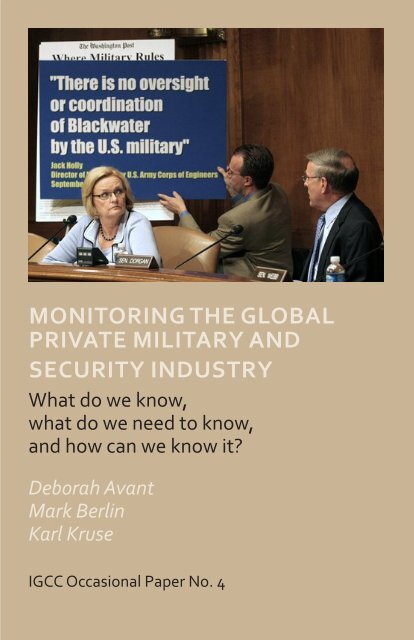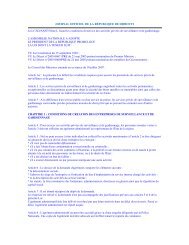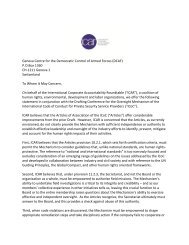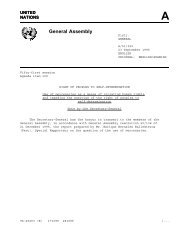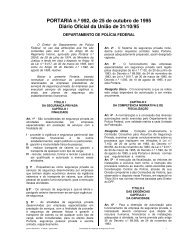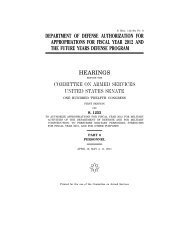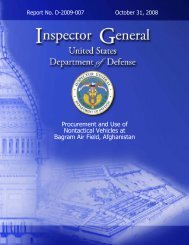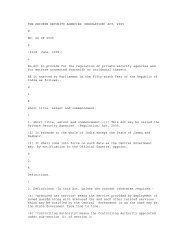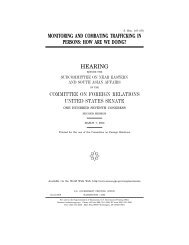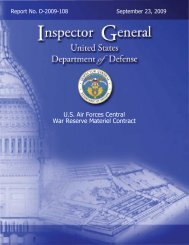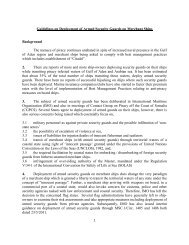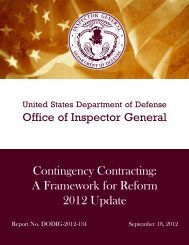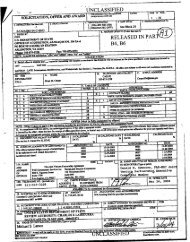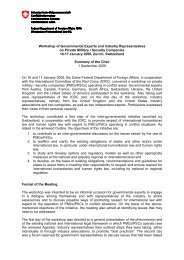monitoring the global private military and security industry
monitoring the global private military and security industry
monitoring the global private military and security industry
Create successful ePaper yourself
Turn your PDF publications into a flip-book with our unique Google optimized e-Paper software.
MONITORING THE GLOBALPRIVATE MILITARY ANDSECURITY INDUSTRYWhat do we know,what do we need to know,<strong>and</strong> how can we know it?Deborah AvantMark BerlinKarl KruseIGCC Occasional Paper No. 4
MONITORINGTHE GLOBAL PRIVATE MILITARYAND SECURITY INDUSTRYWhat do we know, what do we need to know,<strong>and</strong> how can we know it?Deborah AvantMark BerlinKarl KruseReport on a conference held at <strong>the</strong>University of California, IrvineJanuary 27–29, 2011Sponsored byUCI’s International Studies Program <strong>and</strong> CenterUniversity of St. Gallen’s Center for Security, Economics, <strong>and</strong> Technology (CSET)Center for Democratic Control of Armed Forces (DCAF)Office of Research, UC IrvineUC Institute on Global Conflict <strong>and</strong> CooperationCenter for Global Peace <strong>and</strong> Conflict Studies, UC Irvine
Monitoring <strong>the</strong> Global Private Military<strong>and</strong> Security IndustryWhat do we know, what do we need to know,<strong>and</strong> how can we know it?Deborah AvantMark BerlinKarl KruseDefining <strong>the</strong> ChallengeSince <strong>the</strong> 1990s a <strong>global</strong> <strong>private</strong> <strong>military</strong> <strong>and</strong> <strong>security</strong> <strong>industry</strong> has emerged <strong>and</strong> boomed.The <strong>industry</strong> offers opportunities for both states <strong>and</strong> non-state actors to pursue goalsthat require <strong>security</strong> services. Activist, analysts, <strong>and</strong> states all have raised concerns, however,that <strong>the</strong>se forces can operate outside of <strong>the</strong> law <strong>and</strong>/or in a manner inconsistentwith <strong>the</strong> obligations of <strong>and</strong> international laws <strong>and</strong> norms.In response to <strong>the</strong>se concerns, a variety of initiatives (by <strong>the</strong> Swiss government, <strong>the</strong>U.S. government, <strong>the</strong> International Committee of <strong>the</strong> Red Cross, <strong>the</strong> United Nations<strong>and</strong> o<strong>the</strong>rs) have converged around <strong>the</strong> need for regulation. These initiatives generallyagree on appropriate categories of <strong>military</strong> <strong>and</strong> <strong>security</strong> services to be regulated as well ason <strong>the</strong> responsibilities of contracting states, home states, host states, <strong>and</strong> companies underinternational law. Governments, <strong>industry</strong> officials, <strong>and</strong> international organizationshave similarly supported <strong>the</strong> principles underlying an International Code of Conduct<strong>and</strong> indicated interest in developing <strong>and</strong> supporting <strong>global</strong> st<strong>and</strong>ards for <strong>the</strong> <strong>industry</strong>.A 2009 ga<strong>the</strong>ring of experts on <strong>the</strong> PMSC <strong>industry</strong> in Geneva noted <strong>the</strong> convergenceamong regulatory efforts but bemoaned <strong>the</strong> fact that <strong>the</strong> actual behavior of <strong>the</strong>seforces (as well as those who contract with <strong>the</strong>m) is still opaque. Lack of systematic informationabout <strong>the</strong> <strong>industry</strong> poses problems for those researching it, for those attemptingto regulate it, <strong>and</strong> even for <strong>industry</strong> members seeking recognition for proper behavior.Without access to information it is difficult to evaluate whe<strong>the</strong>r companies <strong>and</strong> <strong>the</strong>irclients are abiding by <strong>the</strong>ir legal <strong>and</strong> ethical responsibilities. Publicly available informationis crucial both to <strong>the</strong> success of regulation <strong>and</strong> to systematic academic research on<strong>the</strong> impacts of this <strong>industry</strong>.Accordingly, <strong>the</strong> conference “Information for Monitoring <strong>the</strong> Global Private Military<strong>and</strong> Security Industry” was designed to address <strong>the</strong> issue of information via severalsteps: 1) assessing what information is needed to support various regulatory initiatives;2) cataloguing what information is already being collected <strong>and</strong> by whom; 3) discussingwhat information can be shared <strong>and</strong> <strong>the</strong> best way to share it; <strong>and</strong> 4) brainstormingabout how to collect additional requisite information.During <strong>the</strong> introductory session, <strong>the</strong> conference organizers noted <strong>the</strong>ir commit-
2 Avant, Berlin, <strong>and</strong> Krusement to transparency <strong>and</strong> belief that academic institutions could contribute to <strong>the</strong>regulation of this <strong>industry</strong> in positive ways via research <strong>and</strong> analysis. They noted aninformation wish list that would include information about: consumers of <strong>military</strong><strong>and</strong> <strong>security</strong> services; suppliers of <strong>the</strong>se services; regulators of <strong>the</strong>se services; <strong>and</strong>alleged misbehavior <strong>and</strong> responses to it. More generally, researchers are also interestedin information relevant to assessing <strong>the</strong> effectiveness of <strong>the</strong> various sorts ofregulation—from market power to <strong>industry</strong> self-regulation to multilateral efforts.Academics are concerned with what is being regulated in different instances (behaviorof companies, behavior of clients, behavior of individuals), how regulationis taking place, <strong>and</strong> through which mechanisms. One of <strong>the</strong> conference organizersnoted that <strong>the</strong> various stakeholders in regulatory processes thus far had not includedacademics but now it was time to bring <strong>the</strong>m to <strong>the</strong> table.In <strong>the</strong> discussions that followed, two definitional concerns were raised, onehaving to do with <strong>the</strong> <strong>industry</strong> <strong>and</strong> <strong>the</strong> o<strong>the</strong>r with <strong>the</strong> appropriate stakeholders.Defining <strong>the</strong> <strong>industry</strong>A number of participants pointed out <strong>the</strong> need to define <strong>and</strong> classify <strong>the</strong> universeof companies before talking about regulating <strong>the</strong>m. When we talk about “<strong>private</strong><strong>security</strong> companies” or “contractors,” do we refer only to those services involvingarmed personnel, or do <strong>the</strong>y include logistics <strong>and</strong> development services as well?Companies involved in <strong>the</strong> <strong>private</strong> <strong>military</strong> <strong>and</strong> <strong>security</strong> services <strong>industry</strong> provideservices that fall into three broad categories. First, logistics <strong>and</strong> support services aidin <strong>the</strong> everyday supplying of food, fuel, <strong>and</strong> o<strong>the</strong>r key provisions to <strong>military</strong> forces.Second, <strong>private</strong> <strong>security</strong> services provide protection of persons, places, <strong>and</strong> things.This protection has been in high dem<strong>and</strong> in Afghanistan <strong>and</strong> Iraq but <strong>the</strong>re is alsoan increasing dem<strong>and</strong> for maritime <strong>security</strong> services in light of <strong>the</strong> threat of piracy,particularly off <strong>the</strong> Horn of Africa. Finally, reconstruction services include <strong>security</strong>sector reform, <strong>military</strong> training, law enforcement, <strong>and</strong> development efforts in conflictzones. There are a number of additional services such as intelligence support,risk assessment, <strong>and</strong> interrogation that do not fit neatly into any of <strong>the</strong>se categories.Some participants cautioned that <strong>the</strong> oft-used term “<strong>private</strong> <strong>military</strong> companies”might be a misnomer, as <strong>the</strong>y claimed that no legitimate <strong>private</strong> companiesperform actual offensive operations. The conference organizers pointed out <strong>the</strong>irintention to examine <strong>the</strong> range of services specified in <strong>the</strong> Montreux Document,which focused on Private Military <strong>and</strong> Security Companies (PMSCs)—<strong>private</strong>business entities that provide armed guarding <strong>and</strong> protection, maintenance <strong>and</strong>operation of weapons systems, prisoner detention, <strong>and</strong> advice or training for local<strong>military</strong> <strong>and</strong> <strong>security</strong> forces—as well as those specified by U.S. Commissionon Wartime Contracting, which focused on logistics, <strong>security</strong>, <strong>and</strong> reconstructionservices.Classifying PMSCs is complicated by variation in a number of structural featuresof firms. For example, some PMSCs consist of just a h<strong>and</strong>ful of employees,while o<strong>the</strong>rs are large, publicly-traded corporations. Many PMSCs are based out
Monitoring <strong>the</strong> Global Private Military <strong>and</strong> Security Industry 3of large consumer states, such as <strong>the</strong> United States <strong>and</strong> <strong>the</strong> United Kingdom, whileo<strong>the</strong>rs are indigenous to <strong>the</strong> states in which <strong>the</strong>y operate. Some PMSCs hire mostlyex-<strong>military</strong> or police personnel from <strong>the</strong>ir home states, while o<strong>the</strong>rs draw heavilyon “third-country nationals” (TCNs). Some PMSCs have truly <strong>global</strong> reach whileo<strong>the</strong>rs are focused on particular regions or countries. Finally, some PMSCs projecta high-profile public image, while o<strong>the</strong>rs remain relatively anonymous. Such variancein <strong>the</strong> function <strong>and</strong> character of PMSCs makes attempts at categorizationchallenging.Relevant stakeholdersOne must also define who has a stake in emerging governance structures for <strong>the</strong><strong>industry</strong>. Relevant stakeholders go beyond governments, organizations, <strong>and</strong> individualswho hire PMSCs. While important stakeholders, <strong>the</strong>se groups representonly a portion of <strong>the</strong> entities concerned with <strong>the</strong> regulation of <strong>the</strong> <strong>industry</strong>. Thepopulations who live where PMSCs operate, human rights organizations, intergovernmentalorganizations, as well as domestic <strong>and</strong> international courts all affect<strong>and</strong> are affected by <strong>the</strong> <strong>private</strong> <strong>military</strong> <strong>and</strong> <strong>security</strong> industries. The input <strong>and</strong> cooperationof all of <strong>the</strong>se actors are crucial for comprehensive regulation, <strong>and</strong> thusany information ga<strong>the</strong>ring effort must tap this variety of perspectives. The conferencehosted stakeholders representing governments, <strong>industry</strong> groups, human rightsgroups, <strong>the</strong> media, <strong>the</strong> United Nations, attorneys involved with <strong>the</strong> <strong>industry</strong> fromvarious perspectives, think tanks, <strong>and</strong> academia. Voices of <strong>the</strong> populations who livewhere PMSCs operate, however, were represented only indirectly through humanrights groups. A recurrent <strong>the</strong>me throughout <strong>the</strong> conference was <strong>the</strong> need to bettertap input from <strong>the</strong>se populations.The Current State of RegulationAddressing a broad <strong>and</strong> general audience at UCI, <strong>the</strong> first panel outlined <strong>the</strong> <strong>global</strong>PMSC <strong>industry</strong> as well as <strong>the</strong> current state of regulation for PMSCs. 1 Outlinesof <strong>the</strong> <strong>industry</strong> focused on many of <strong>the</strong> features outlined in <strong>the</strong> previous section.The current state of regulation addressed <strong>the</strong> efforts of <strong>industry</strong> groups, multistakeholderinitiatives, <strong>and</strong> U.S. government initiatives.Some firms <strong>and</strong> <strong>industry</strong> groups are making efforts towards self-regulation.Many firms have a code of conduct <strong>and</strong> internal ethics program in place. Approximately70 companies belong to one or more <strong>industry</strong> associations such as<strong>the</strong> Private Security Company Association Iraq (PSCAI), 2 ADS Group, <strong>the</strong> BritishAssociation of Private Security Companies (BAPSC), 3 or <strong>the</strong> International StabilityOperations Association (ISOA). 4 Each of <strong>the</strong>se <strong>industry</strong> associations attempts1. More information about <strong>the</strong> panel available at: http://internationalstudies.ss.uci.edu/node/2025. Video link available at: http://ocw.uci.edu/lectures/lecture.aspx?id=439.2. http://www.pscai.org/.3. http://www.bapsc.org.uk/default.asp.4. http://ipoaworld.org/eng/.
4 Avant, Berlin, <strong>and</strong> Kruseto promote accountability <strong>and</strong> compliance with existing rules <strong>and</strong> gives input on<strong>the</strong> creation <strong>and</strong> implementation of new ones. ISOA, for instance, has a code ofconduct, internal grievance process, <strong>and</strong> st<strong>and</strong>ards board.Ano<strong>the</strong>r <strong>industry</strong> group that deals with <strong>security</strong> contracting, if not internationalcontracting as discussed here, is ASIS International. 5 ASIS provides education,training, <strong>and</strong> guidelines for <strong>the</strong> <strong>private</strong> <strong>security</strong> profession. Currently ASISdoes not deal specifically with companies who provide services in conflict zones,but <strong>the</strong>ir programs confront similar issues regarding <strong>the</strong> vetting, training, <strong>and</strong>certification of <strong>private</strong> <strong>security</strong> personnel. ASIS administers a number of its owninternationally-accredited certification programs for <strong>security</strong> practitioners. It isalso involved in developing <strong>industry</strong> st<strong>and</strong>ards <strong>and</strong> guidelines through <strong>the</strong> ASISInternational St<strong>and</strong>ards <strong>and</strong> Guidelines Commission.Beyond <strong>the</strong> <strong>industry</strong>, several multi-stakeholder initiatives aim to harmonizeregulatory efforts, cheif among <strong>the</strong>m being <strong>the</strong> Montreux Document <strong>and</strong> <strong>the</strong> InternationalCode of Conduct. The Montreux process was initiated by <strong>the</strong> Swissgovernment <strong>and</strong> <strong>the</strong> International Commission of <strong>the</strong> Red Cross (ICRC). It reflects<strong>the</strong> participation of eighteen country representatives, including <strong>the</strong> UnitedStates, in consultation with <strong>industry</strong> <strong>and</strong> civil society groups. The idea was toclearly outline <strong>the</strong> responsibilities of states in <strong>the</strong>ir relations with PMSCs. 6 TheMontreux Document does not establish new law, but instead describes <strong>and</strong> clarifies<strong>the</strong> responsibilities of states <strong>and</strong> PMSCs under existing international humanitarian<strong>and</strong> human rights law. It also seeks to aid states <strong>and</strong> PMSCs in meeting <strong>the</strong>irlegal obligations by outlining “good practices” for states that contract with PMSCs(contracting states), states where PMSCs operate (territorial states), <strong>and</strong> states fromwhich PMSCs or <strong>the</strong>ir employees hail (home states).The International Code of Conduct (ICoC) for <strong>private</strong> <strong>security</strong> providers isa multi-stakeholder initiative that pledges signatories to <strong>the</strong> principles articulatedin <strong>the</strong> Montreux Document. The document was <strong>the</strong> result of an inclusive draftingprocess initiated by companies <strong>and</strong> <strong>industry</strong> associations <strong>and</strong> coordinated by<strong>the</strong> Swiss government, with strong support from <strong>the</strong> United States, Great Britain,<strong>and</strong> civil society organizations. So far <strong>the</strong> ICoC pertains only to those companiesproviding <strong>security</strong> services, 7 but it is meant to be exp<strong>and</strong>ed to cover <strong>the</strong> full rangeof companies providing contingency services in <strong>the</strong> field. Signatories “affirm that<strong>the</strong>y have a responsibility to respect <strong>the</strong> human rights of, <strong>and</strong> fulfil humanitarianresponsibilities towards, all those affected by <strong>the</strong>ir business activities.” 8 The ICoCoutlines specific rules regarding <strong>the</strong> use of force, vetting <strong>and</strong> training of personnel,5. http://www.asisonline.org/.6. See The Montreux Document, available at: http://www.eda.admin.ch/psc.7. Which it defines as “guarding <strong>and</strong> protection of persons <strong>and</strong> objects, such as convoys,facilities, designated sites, property or o<strong>the</strong>r places (whe<strong>the</strong>r armed or unarmed), or anyo<strong>the</strong>r activity for which <strong>the</strong> Personnel of Companies are required to carry or operateaweapon in <strong>the</strong> performance of <strong>the</strong>ir duties.”8. See The International Code of Conduct for Private Security Providers, available at:http://www.icoc-psp.org/.
Monitoring <strong>the</strong> Global Private Military <strong>and</strong> Security Industry 5<strong>and</strong> <strong>the</strong> reporting of incidents. The document also initiates a path forward towards<strong>the</strong> establishment of a third-party governance <strong>and</strong> oversight mechanism that willeventually monitor, certify, <strong>and</strong> enforce compliance; field complaints; <strong>and</strong> investigateviolations. It is hoped that clients only hire providers that have signed <strong>and</strong>comply with <strong>the</strong> Code <strong>and</strong> that <strong>the</strong> Code will improve <strong>the</strong> human rights performanceof <strong>the</strong> industy. A multi-stakeholder steering committee has been establishedthat will oversee <strong>the</strong> development of <strong>the</strong> Code’s oversight <strong>and</strong> governance mechanisms.The goal is to have an operational plan for <strong>the</strong> oversight mechanism by <strong>the</strong>end of November 2011. Once in place, <strong>the</strong> independent governance <strong>and</strong> oversightmechanism will assume responsibility for <strong>the</strong> Code’s fur<strong>the</strong>r administration <strong>and</strong>maintenance. In addition, <strong>the</strong> ICoC calls on signatories <strong>and</strong> stakeholders to aidnational st<strong>and</strong>ards bodies in harmonizing <strong>the</strong>ir st<strong>and</strong>ards with those establishedin <strong>the</strong> Code.As well, <strong>the</strong> Voluntary Principles on Security <strong>and</strong> Human Rights (VPs) providesnonbinding guidelines designed with extractive <strong>and</strong> energy <strong>industry</strong> companiesin mind. The goal is to provide <strong>the</strong>se companies guidance on how to maintain“<strong>the</strong> safety <strong>and</strong> <strong>security</strong> of <strong>the</strong>ir operations within an operating framework thatensures respect for human rights <strong>and</strong> fundamental freedoms.” 9 The VPs were <strong>the</strong>result of a cooperative effort by <strong>the</strong> U.S. <strong>and</strong> U.K governments, extractive <strong>and</strong> energycompanies, <strong>and</strong> human rights <strong>and</strong> o<strong>the</strong>r civil society groups. The VPs focus onensuring that companies conduct risk assessments <strong>and</strong> due diligence with regard toboth <strong>private</strong> <strong>and</strong> public <strong>security</strong> options. In so doing, <strong>the</strong> VPs specify a number ofgood practices to guide companies in <strong>the</strong>ir use of <strong>private</strong> <strong>security</strong> companies. Theseguidelines call on companies to ensure that PMSCs <strong>the</strong>y contract: have clear policieson <strong>the</strong> use of force; do not engage in offensive or any o<strong>the</strong>r types of operationsthat are <strong>the</strong> responsibility of state forces; do not employ individuals with recordsof misconduct; are adequately monitored by clients or third parties <strong>and</strong> any allegationsof misconduct or abuses investigated. At a 2009 plenary, participants alsoadopted a number of measures to facilitate <strong>the</strong> implementation of <strong>the</strong> VPs. Theseincluded new membership criteria that would make participation contingent oncompanies meeting reporting requirements. The 2009 meeting also encouragedimplementation through “in-country processes” such as training workshops, meetings,<strong>and</strong> awareness-raising initiatives.More generally, <strong>the</strong> United Nations “Protect, Respect, <strong>and</strong> Remedy” Frameworkfor Business <strong>and</strong> Human Rights (UN Framework) serves as a reference forproviders <strong>and</strong> clients (both state <strong>and</strong> <strong>private</strong>) alike. Developed by UN Special Representative<strong>and</strong> Harvard professor John Ruggie, <strong>the</strong> UN framework aims to outline<strong>the</strong> responsibilities of states <strong>and</strong> companies (including PMSCs <strong>and</strong> firms that hire<strong>the</strong>m) regarding <strong>the</strong> potential impact of companies on human rights. The nonbindingframework calls on companies to exercise due diligence, that is: “stepsa company must take to become aware of, prevent, <strong>and</strong> address adverse human9. See The Voluntary Principles on Security <strong>and</strong> Human Rights, available at: http://www.voluntaryprinciples.org/.
6 Avant, Berlin, <strong>and</strong> Kruserights impacts.” 10 This includes assessing how such factors as a company’s businesspartners, <strong>the</strong> local context within which it will operate, <strong>and</strong> <strong>the</strong> record of <strong>the</strong>host state’s government may conflict with its responsibility to respect <strong>and</strong> protecthuman rights. While <strong>the</strong> UN Framework currently lacks compliance or oversightmechanisms, in June 2011 Special Representative Ruggie will submit a set of guidingprinciples for its implementation.Thus far, none of <strong>the</strong>se initiatives creates binding obligations for states or o<strong>the</strong>ractors, but instead <strong>the</strong>y attempt to establish a common set of principles by whichstates, companies, <strong>and</strong> o<strong>the</strong>rs should operate. 11 This type of regulation relies largelyon clients to police those <strong>the</strong>y hire. This means that clients need access to severaltypes of information vis-a-vis <strong>the</strong> personnel <strong>and</strong> companies <strong>the</strong>y might hire. First,clients conducting due diligence in <strong>the</strong>ir contracting practices need access to informationabout companies’ personnel to ensure that personnel are properly vetted,trained, <strong>and</strong> certified as stipulated by <strong>the</strong> Montreux Document <strong>and</strong> <strong>the</strong> ICoC.Second, efforts to oversee <strong>and</strong> prosecute individual violations require informationcollected from field. As such, <strong>the</strong> ICoC stipulates procedures for reporting of incidentsinvolving any use of a weapon by contractor personnel. Also, injuries ordeaths of contractor personnel are not subject to <strong>the</strong> same reporting requirementsunder government rules as are <strong>military</strong> personnel. Therefore, it is important thatadditional <strong>monitoring</strong> mechanisms are in place to guarantee that such informationis reported accurately <strong>and</strong> reliably.In response to events in Iraq <strong>and</strong> Afghanistan, <strong>the</strong> U.S. government has fur<strong>the</strong>rdeveloped regulations <strong>and</strong> oversight mechanisms relevant to <strong>the</strong> PMSC <strong>industry</strong>.Consistent with <strong>the</strong> guidance in <strong>the</strong> Montreux Document, <strong>the</strong> Department ofDefense has issued specific instructions on <strong>the</strong> use of <strong>private</strong> <strong>security</strong> companies(PSCs). These companies must operate according to public law <strong>and</strong> <strong>the</strong> laws ofl<strong>and</strong> warfare. Their duties are limited to guarding people <strong>and</strong> places. They are notallowed to engage in “offensive” actions, although <strong>the</strong>re is still an active debatewithin <strong>the</strong> U.S. government about appropriate functions for <strong>security</strong> contractors.Government contracts for PMSCs are subjected to a pre-award review to ensurethat company personnel are properly licensed, trained, <strong>and</strong> vetted. The UnitedStates has also implemented a quarterly census through which it tracks all contractedpersonnel in contingency operations, <strong>and</strong> has developed more specific regulation<strong>and</strong> tracking of those contractors who provide <strong>private</strong> <strong>security</strong> functions. The2011 National Defense Authorization Act extends this more specific guidance to<strong>private</strong> <strong>security</strong> contractors operating not only in contingency operations but alsoin combat operations or o<strong>the</strong>r significant <strong>military</strong> operations around <strong>the</strong> globe.10. See The United Nations “Protect, Respect, <strong>and</strong> Remedy” Framework for Business<strong>and</strong> Human Rights, available at: http://www.reports-<strong>and</strong>-materials.org/Ruggie-report-7-Apr-2008.pdf/.11. Though <strong>the</strong> ICoC is currently engaged in a process to build an international oversight<strong>and</strong> compliance mechanism with which Signatory Companies would be contractuallyobligated to comply.
Monitoring <strong>the</strong> Global Private Military <strong>and</strong> Security Industry 7During contract execution, companies are subject to existing laws in both <strong>the</strong>United States <strong>and</strong> <strong>the</strong> host nation. For example, <strong>the</strong> Military Extraterritorial JurisdictionAct (MEJA) allows <strong>the</strong> United States to exercise extraterritorial jurisdictionover contractors or civilians under Department of Defense (DoD) contracts <strong>and</strong>who commit federal crimes in <strong>the</strong> field. MEJA, however, only applies to individualsaccompanying <strong>military</strong> forces. This has caused difficulty in attempts to prosecutecrimes committed by contractors who accompany <strong>the</strong>se o<strong>the</strong>r agencies, asdemonstrated in <strong>the</strong> case of <strong>the</strong> Nisour Square incident. 12There remain substantial gaps in <strong>the</strong> capacity of <strong>the</strong> U.S. government to oversee<strong>the</strong> activities of PMSCs. A large <strong>and</strong> continuing problem is <strong>the</strong> lack of welltrainedcontract officers. This problem has been recognized by <strong>the</strong> GAO, <strong>the</strong> CRS,<strong>the</strong> CWC, <strong>the</strong> Special Inspectors General for Iraq <strong>and</strong> Afghanistan, <strong>and</strong> <strong>the</strong> Departmentof Defense.A variety of U.S. efforts are underway to enhance <strong>the</strong> regulation of PSCs. Someof <strong>the</strong>se are unilateral. For instance, Congress has debated developing a CivilianExtraterritorial Jurisdiction Act (CEJA) in order to apply federal law to contractorsaccompanying government agencies such as <strong>the</strong> State Department <strong>and</strong> US-AID just as MEJA applies such law to those accompanying <strong>the</strong> <strong>military</strong>. A goodamount of U.S. energy, however, is directed toward supporting international <strong>and</strong>multi-stakeholder initiatives such as <strong>the</strong> ICoC. The United States is eager for <strong>global</strong>st<strong>and</strong>ards that will “raise <strong>the</strong> bar” for consumers <strong>and</strong> providers of <strong>security</strong> servicesaround <strong>the</strong> world.What Information Is Out There?There are currently numerous data collection efforts of varying scope, depth, <strong>and</strong>focus that cover <strong>the</strong> PMSC <strong>industry</strong>. Conference participants discussed initiativesthat address <strong>the</strong> size <strong>and</strong> shape of <strong>the</strong> <strong>industry</strong> as well as ways to evaluate companyperformance. They were interested in organizing information with regard to firmresponsibilities both to <strong>the</strong>ir customers <strong>and</strong> to <strong>the</strong>ir publics.Much of <strong>the</strong> existing information is concentrated in <strong>the</strong> United States. Asa leading consumer of <strong>military</strong> <strong>and</strong> <strong>security</strong> services, <strong>the</strong> United States has collecteda variety of data pertaining both to corporations in general as well as governmentcontracts. Some information helps observers underst<strong>and</strong> what sort of workis being done by whom. Upcoming <strong>and</strong> active contract solicitations can be foundat FedBizOps.gov. 13 Those looking to underst<strong>and</strong> <strong>and</strong> track trends on U.S. governmentspending by region or company may find a user-friendly interface atUSASpending.gov. 14 The Federal Procurement Data System (FPDS) is a compre-12. Steve Fainaru <strong>and</strong> Saad Al-Izzi, “U.S. Security Contractors Open Fire in Baghdad:Blackwater Employees Were Involved in Two Shooting Incidents in Past Week,” WashingtonPost, May 27, 2007, A01.13. http://www.fbo.gov.14. http://usaspending.gov.
8 Avant, Berlin, <strong>and</strong> Krusehensive central database for U.S. government contracts. 15 This resource offers informationon U.S. federal government contracts including size, location, <strong>and</strong> companyinformation. Although some participants pointed out that it is not entirelyreliable <strong>and</strong> prone to mislabeling <strong>and</strong> entry errors, it none<strong>the</strong>less contains muchuseful data on <strong>the</strong> number, cost, <strong>and</strong> m<strong>and</strong>ate of individual contracts. The Departmentof Defense’s Office of <strong>the</strong> Assistant Secretary of Defense for Program Supportprovides information on applicable regulations for contingency contracting,regulatory changes, relevant congressional reports, <strong>and</strong> quarterly census reports. 16O<strong>the</strong>r data sources provide insight into <strong>the</strong> how companies perform while executing<strong>the</strong>ir contracts. The Department of Defense has in its possession numerous“SPOT” reports made by <strong>military</strong> officers in operational areas. As of now, thoseremain classified <strong>and</strong> not open for public review. The Department of Labor’s Officeof Workers Compensation maintains a public database on workplace injuries <strong>and</strong>deaths for contractors. 17 Statistics here, based on Defense Base Act workers compensationinsurance claims, can be sorted by employer, insurer, <strong>and</strong> by date. But asone panelist noted, without <strong>the</strong> proper context, it is difficult to know whe<strong>the</strong>r suchincidents represent irresponsible performance or merely higher-risk work. The Departmentof Defense Task Force on Wartime Contracting (TFWC) has issued anumber of reports that identify <strong>and</strong> address existing problems with <strong>the</strong> procurement<strong>and</strong> oversight of <strong>private</strong> <strong>security</strong> companies. The DoD Inspector General’sreport “Hard Lessons: The Iraq Reconstruction Experience” also highlighted manyissues relating to <strong>the</strong> use of <strong>private</strong> <strong>security</strong> companies in reconstruction efforts. TheSpecial Inspector General for Iraq Reconstruction <strong>and</strong> Special Inspector Generalfor Afghanistan Reconstruction produce periodic reports on contracting activitiesin those areas. 18 Several participants pointed to <strong>the</strong> non-partisan CongressionalCommission on Wartime Contracting (CWC) as a source of valuable information.O<strong>the</strong>r U.S. government agencies, including <strong>the</strong> Congressional Research Service(CRS) <strong>and</strong> <strong>the</strong> Government Accountability Office (GAO), have also produceduseful studies. These reports are particularly valuable in uncovering <strong>and</strong> presentinginformation that would o<strong>the</strong>rwise not be publicly available.Participants noted that governments beyond <strong>the</strong> United States are engagedin <strong>the</strong>ir own efforts to track <strong>the</strong> <strong>industry</strong>, though often at arms’ length. Some ofthis occurs through non-governmental or quasi non-governmental organizations.Britain’s Security Industry Authority (SIA), for instance, ga<strong>the</strong>rs information on<strong>the</strong> individuals that it licenses while maintaining a register of “approved contractors.”It should be recognized that <strong>the</strong> SIA’s principal remit is <strong>the</strong> improvement ofst<strong>and</strong>ards in <strong>the</strong> delivery of unarmed <strong>security</strong> services within <strong>the</strong> United Kingdom.The Center for <strong>the</strong> Democratic Control of Armed Forces (DCAF) is funded in partby <strong>the</strong> Swiss government, but has 54 o<strong>the</strong>r governments as members. The “<strong>private</strong>-15. https://www.fpds.gov/fpdsng_cms/.16. http://www.acq.osd.mil/log/PS/bio.htm.17. http://www.dol.gov/owcp/dlhwc/IndustryDBAPerformanceResults.htm.18. http://www.sigir.mil.
Monitoring <strong>the</strong> Global Private Military <strong>and</strong> Security Industry 9<strong>security</strong>regulation.net” portion of DCAF’s website features a database of regulationsfacing PMSCs in 50 countries, as well as toolkits for companies, civil society,<strong>and</strong> governments seeking to bring greater accountability to <strong>the</strong> <strong>private</strong> <strong>security</strong> sector.DCAF is also instrumental in promoting <strong>the</strong> implementation of <strong>the</strong> MontreuxDocument <strong>and</strong> <strong>the</strong> ICoC. The icoc-psp.org website contains a list of <strong>the</strong> SignatoryCompanies, which as of this writing numbers 94. The Global Consortium on SecurityTransformation (GCST), started initially by <strong>the</strong> Canadians <strong>and</strong> <strong>the</strong> British,is also active in broad <strong>security</strong> sector reform <strong>and</strong> produces reports along those lines.Insight from firms <strong>and</strong> <strong>the</strong> <strong>industry</strong> itself is not to be overlooked. Some conferenceattendees lamented <strong>the</strong> homogeneity of company websites. However, a fewattendees noted that <strong>the</strong>se sites can serve as a good starting point for ga<strong>the</strong>ringinformation about a given company. The websites of <strong>industry</strong> associations likeADS Group, BAPSC, PSCAI, or ISOA contain general information on associationmembers. The ISOA website in particular contains information on <strong>the</strong> servicesparticular companies provide at <strong>the</strong> locations of <strong>the</strong>ir offices worldwide.Much of <strong>the</strong> initial information on <strong>the</strong> <strong>industry</strong> came through <strong>the</strong> work ofjournalists. These reports play a critical role both in informing publics <strong>and</strong> are a resourcefor some academic work on <strong>the</strong> <strong>industry</strong>. The project at <strong>the</strong> Free University(described below), for instance, is sourced from news publication databases such asLexisNexis. Journalists base <strong>the</strong>ir reports on individual sources (often anonymouscompetitors, disgruntled employees, or government minders), <strong>industry</strong> sources,publicly available government sources, <strong>and</strong> personal experience. The best reportinguses all of <strong>the</strong>se <strong>and</strong> results in concentrated investigative work. A good exampleis <strong>the</strong> “Disposable Army” series available through ProPublica, which documentscontractor casualties <strong>and</strong> how <strong>the</strong> U.S. government is dealing with <strong>the</strong>m. 19Attendees commented that such nuanced <strong>and</strong> in-depth information aboutPMSC operations <strong>and</strong> performance, as well as information on specific firms, bringsto light things that slip through <strong>the</strong> cracks of structured government reportingmechanisms or academic accounts. Many thought that <strong>the</strong> work of journalistsmight be better suited to identifying idiosyncratic or cultural elements of particularfirms, which in turn helps observers underst<strong>and</strong> past behavior <strong>and</strong> get an ideaof how firms may behave in <strong>the</strong> future. Attendees noted, however, that <strong>the</strong> workof journalists has its own limitations. Informants may be unreliable or driven bypersonal agendas, such as retaliation against a former employer or undermining <strong>the</strong>competition. Never<strong>the</strong>less, journalists, especially when embedded with troops orPMSCs, can provide an on-<strong>the</strong>-ground picture of firms’ behavior that is lacking inmany of o<strong>the</strong>r sources.Information has also been provided by human rights advocates. Some of <strong>the</strong>sefocus specifically on <strong>the</strong> <strong>global</strong> <strong>military</strong> <strong>and</strong> <strong>security</strong> <strong>industry</strong>. The InternationalCommittee of <strong>the</strong> Red Cross sponsors a project on <strong>the</strong> privatization of war, publishingreports that focus on international humanitarian law <strong>and</strong> how it relates to19. http://www.propublica.org/series/disposable-army.
10 Avant, Berlin, <strong>and</strong> Kruse<strong>the</strong> <strong>industry</strong>. 20 Organizations like Corpwatch.org have been following <strong>the</strong> <strong>industry</strong>in <strong>the</strong> United States for most of <strong>the</strong> decade <strong>and</strong> have compiled a number of newsstories, reports, <strong>and</strong> company profiles. Human Rights First has produced a projectaimed at “ending contractor impunity,” which contains a number of reports onevents, cases, <strong>and</strong> <strong>the</strong> legal situation regarding contractors. 21O<strong>the</strong>r human rights groups focus more on <strong>the</strong> corporations that hire ei<strong>the</strong>rPMSCs or government troops to secure <strong>the</strong>mselves. RAID (Rights <strong>and</strong> AccountabilityIn Development) is such an organization. It provides information on corporateactivity in ill-governed parts of <strong>the</strong> world. While <strong>the</strong>se organizations canaccomplish much when it comes to <strong>monitoring</strong>, one panelist lamented <strong>the</strong> factthat many of <strong>the</strong>m work in <strong>the</strong> EU/UK legal context where, given privacy <strong>and</strong>libel laws, <strong>the</strong>y can share very little information without <strong>the</strong> explicit permissionof those on whom <strong>the</strong>y are reporting. Thus, only through novel ways of collecting<strong>and</strong> distributing information can <strong>the</strong>se NGOs have much impact. These organizationsmay be useful partners, however, for tapping into local voices of populationsaround whom PMSCs work.Humanitarian NGOs have had increasing contact with <strong>the</strong> PMSC <strong>industry</strong>given <strong>the</strong>ir work on <strong>the</strong> ground. Some of this has come as <strong>the</strong>se organizations havebeen compelled to develop <strong>the</strong>ir own <strong>security</strong> planning <strong>and</strong> have worked withPMSCs to do this. InterAction, for instance, has produced its own compendiumon NGO <strong>security</strong> <strong>and</strong> risk mitigation. 22 O<strong>the</strong>r contact has come as all actors on<strong>the</strong> ground in conflict zones (NGOs, corporations, governments, <strong>and</strong> PMSCs)have begun to share information on attacks. There are processes for sharing suchinformation in several conflict ridden areas. 23 Again, InterAction has developedprinciples for this sort of information sharing. 24A number of academic-led initiatives seek to examine various aspects of <strong>the</strong><strong>private</strong> <strong>security</strong> <strong>industry</strong>. At <strong>the</strong> Free University of Berlin, <strong>the</strong> “Private SecurityDatabase” project ga<strong>the</strong>rs information on government actors (such as states, <strong>the</strong>UN, <strong>and</strong> NATO) that use PMSCs <strong>and</strong> has compiled a database lending itself toquantitative analysis. The project data portrays “who consumed <strong>private</strong> <strong>security</strong>in Areas of Limited Statehood (where, how long) <strong>and</strong> what kind of <strong>security</strong> wasconsumed.” 25 By examining news stories retrieved online, this project breaks down20. http://www.icrc.org/eng/war-<strong>and</strong>-law/contemporary-challenges-for-ihl/privatizationwar/overview-privatization.htm.21. http://www.humanrightsfirst.org/our-work/law-<strong>and</strong>-<strong>security</strong>/ending-contractor-impunity/.22. http://www.interaction.org/ngo-<strong>security</strong>.23. Abby Stoddard, Adele Harmer <strong>and</strong> Victoria DiDomenico. “Providing Aid in InsecureEnvironments 2009 Update” HPG Policy Brief 34 (Humanitarian Policy Group, OverseasDevelopment Institute, April 2009).24. John Schafer <strong>and</strong> Pete Murphy, “Security Collaboration: Best Practice Guide,” Inter-Action Resource Paper, September 2010.25. http://www.branovic.com/projects.html.
Monitoring <strong>the</strong> Global Private Military <strong>and</strong> Security Industry 11contracting relationships between companies <strong>and</strong> government bodies with eachmention of a relationship in a year counted as that company having a link for thatyear. Each link must be confirmed through three sources, making this a rigorouslytested database, sometimes even excluding possible links at <strong>the</strong> expense of ensuringaccuracy.EUI’s PRIV-WAR project looks specifically at legal <strong>and</strong> regulatory initiativesvis a vis <strong>the</strong> <strong>security</strong> <strong>industry</strong>. Over <strong>the</strong> past two years, PRIV-WAR scholars haveproduced multiple publications regarding <strong>the</strong> status of regulation in <strong>the</strong> <strong>industry</strong>,including a large edited volume, War by Contract. 26 These efforts outline legal requirementsthat face firms <strong>and</strong> those who hire <strong>and</strong> monitor <strong>the</strong>m. They also gointo some depth about existing case law in <strong>the</strong> international context <strong>and</strong> how itpertains to PMSCs.O<strong>the</strong>r initiatives discussed include a project organized by Molly Dunigan(RAND) <strong>and</strong> Ulrich Petersohn (ETH Zurich) called “Markets for Force,” whichfocuses on <strong>the</strong> different regional dynamics within <strong>the</strong> <strong>global</strong> market. The projectwill hold an workshop <strong>and</strong> several panels at <strong>the</strong> 2011 ISA annual meeting inMontreal. Attendees also referred to relevant expertise at <strong>the</strong> University of Ottawa(Michael Williams <strong>and</strong> Rita Abrahamsen), DePaul University, National DefenseUniversity (TX Hammes <strong>and</strong> Sean McFate) <strong>and</strong> Harvard University.Think tanks <strong>and</strong> <strong>the</strong>ir products surfaced as useful sources numerous timesthroughout <strong>the</strong> conference. The Center for New American Security sponsors aproject on contracting in conflicts, focusing on evaluating past performance <strong>and</strong>making concrete recommendations for future policies. 27 RAND Corporation researchershave also engaged <strong>the</strong> issue, offering monographs <strong>and</strong> Congressional testimonythat is available on <strong>the</strong> organization’s website. 28 The Center for AmericanProgress offers a series on contracting with regards to <strong>the</strong> U.S. government <strong>and</strong>human rights issues in Iraq <strong>and</strong> Afghanistan. 29Despite all <strong>the</strong>se sources, attendees noted that crucial information shortfallsremain. First, most of this data pertains to PMSCs hired by governments, in particular<strong>the</strong> U.S. government. Attendees expressed concern that <strong>the</strong> existing dataaccounts for only a portion of <strong>the</strong> total <strong>industry</strong> at a time when <strong>private</strong> consumptionof PMSC services is growing. A large share of PMSC services are consumed byo<strong>the</strong>r <strong>private</strong> actors, such as extractive service firms. There is little publicly availableinformation on <strong>the</strong>se types of <strong>private</strong>-to-<strong>private</strong> transactions. Some PMSCs arepublicly traded companies, <strong>and</strong> thus are more transparent due to reporting requirements.But many PMSCs, as well as <strong>the</strong>ir clients, are <strong>private</strong>ly held corporations<strong>and</strong> are not required to disclose information.26. Francesco Francioni <strong>and</strong> Natalino Ronzitti, eds. War by Contract: Human Rights, HumanitarianLaw, <strong>and</strong> Private Contractors (Oxford: Oxford University Press, 2011).27. http://www.cnas.org/node/3666.28. http://www.r<strong>and</strong>.org/content/dam/r<strong>and</strong>/pubs/testimonies/2010/RAND_CT349.pdf.29. http://www.americanprogress.org/issues.
12 Avant, Berlin, <strong>and</strong> KruseSecond, participants pointed out that many government consumers of PMSCservices are not inclined to dedicate <strong>the</strong> kind of resources to compile <strong>and</strong> reportrelevant information that <strong>the</strong> United States has. Also, many PMSCs are based interritories that do not have <strong>the</strong> same disclosure rules as American firms. Finally,<strong>the</strong>re is very little information on PMSC personnel <strong>the</strong>mselves. Do employeeshave criminal records or histories of mental health problems? Do <strong>the</strong>y have recordsof negligent behavior? This data is even more limited on host-country personnelor third-party nationals. Even if this information were collected, privacy considerationsmake dissemination of it difficult.What Information Do We Need to Make Oversight<strong>and</strong> Regulation More Effective?Participants agreed that performance data is necessary at all levels of <strong>the</strong> process, toensure consumers can make informed decisions about hiring, to encourage appropriatebehavior (by individuals working for PMSCs, PMSCs, <strong>and</strong> PMSC clients),to enable oversight, <strong>and</strong> to allow for adjudication of alleged misbehavior. While allwho were present agreed on <strong>the</strong> need for more information than is currently available,<strong>the</strong>re were different views about who needed to know what. There was alsosome tension about <strong>the</strong> most important purpose for information. Some tended tosee such information as providing better accountability to clients, while o<strong>the</strong>rs emphasized<strong>the</strong> need for accountability to populations impacted on <strong>the</strong> ground. Stillo<strong>the</strong>rs saw information as important not only for oversight but also for putting inplace preventative measures to reduce <strong>the</strong> chances for misbehavior in <strong>the</strong> first place.Most attendees agreed that it was important for companies to collect informationabout personnel to help <strong>the</strong>m exercise scrutiny in <strong>the</strong>ir hiring practices.For companies, access to criminal <strong>and</strong> mental health records would be useful inevaluating potential personnel. Access to information regarding <strong>the</strong> amount <strong>and</strong>type of training PSC personnel have received, as well as <strong>the</strong>ir service records, wouldhelp both clients <strong>and</strong> providers make more informed acquisition decisions. Howto practically share such information, however, was not obvious. The idea thatcompanies might have or share a “blacklist” of employees with a history of poorbehavior was discussed, but dismissed due to questions of fairness, transparency,<strong>and</strong> legality.Information on companies is also vital to <strong>the</strong> interests of both clients <strong>and</strong> publics.Participants pointed out that clients included not only governments but alsointergovernmental organizations (like <strong>the</strong> UN), NGOs, <strong>and</strong> commercial actors. Allof <strong>the</strong>se clients have an interest in hiring PMSCs that will behave properly <strong>and</strong> allcould benefit from knowing how to judge PMSCs <strong>and</strong> contract with <strong>the</strong>m in a waythat will reduce <strong>the</strong> prospects for poor behavior.What information might clients want to know? Knowledge about equipmentlevels, skills, training, tax/license status, <strong>and</strong> staff turnover were all mentionedas potentially important. At a more abstract level, underst<strong>and</strong>ing aboutcompany ethos, trade association membership, <strong>and</strong> relationships with particulargovernments could also help clients make better acquisition decisions. Several par-
Monitoring <strong>the</strong> Global Private Military <strong>and</strong> Security Industry 13ticipants throughout <strong>the</strong> conference noted that <strong>the</strong> “culture” of an organizationgreatly influences <strong>the</strong> behavior of its personnel. To this end, some suggested thatattention to a firm’s policies regarding alcohol consumption might be useful forgauging <strong>the</strong> likelihood that its employees would misbehave. Similarly, examininga company’s policies on <strong>the</strong> use of force may also provide a useful gauge of a company’scommitment to responsible conduct. Finally, one may consider a <strong>security</strong>firms’ psychological screening process. Because such screening is very costly <strong>and</strong>not required by most contracts, such policies may serve as indicators as to whichfirms are more proactive about ensuring responsible conduct.Discussions regarding information about PSC clients raised a number of issuesfor <strong>the</strong> attendees. Some voiced <strong>the</strong> support for asking companies to identify <strong>the</strong>ircustomers. This could enable scrutiny of clients that repeatedly hire PSCs that misbehave.Most agreed, however, that ga<strong>the</strong>ring <strong>and</strong> sharing this kind of informationmight not be feasible.Some participants noted that <strong>industry</strong> st<strong>and</strong>ards have <strong>the</strong> potential to encourageproper behavior regardless of client choices <strong>and</strong> could be very beneficial to clientswith less expertise in contracting for <strong>security</strong>. There was concern among someattendees about how st<strong>and</strong>ards should be developed: through national st<strong>and</strong>ardsprocesses such as <strong>the</strong> American National St<strong>and</strong>ards Institute (ANSI) or throughmulti-stakeholder processes such as <strong>the</strong> ICoC? O<strong>the</strong>rs, however, argued that ANSIprocesses were actually multi-stakeholder—or at least consultative—<strong>and</strong> could becomplementary to <strong>the</strong> ICoC process. Some participants remained concerned thatANSI is primarily <strong>industry</strong> driven <strong>and</strong> does not have clear decision-making processesthat balance power among relevant stakeholder groups.Several attendees pointed out that <strong>the</strong> current moment presented a uniquewindow of opportunity for st<strong>and</strong>ardizing <strong>the</strong> PSC <strong>industry</strong>. As one participantnoted, <strong>the</strong> purchasing power of <strong>the</strong> United States has led to a “Wal-Mart effect”whereby U.S. practice largely shapes <strong>the</strong> activities of <strong>the</strong> whole <strong>industry</strong>. Because<strong>the</strong> United States is, at present, very interested in clear <strong>and</strong> strong st<strong>and</strong>ards for<strong>private</strong> <strong>security</strong> providers, it could impact <strong>the</strong> development of st<strong>and</strong>ards for thissegment of <strong>the</strong> <strong>industry</strong> across <strong>the</strong> globe. U.S. market power, however, may soonbe on <strong>the</strong> wane as it winds down its operations in Iraq <strong>and</strong> looks forward to doing<strong>the</strong> same in Afghanistan. Reduced U.S. power could lead to less uniformity in <strong>the</strong><strong>industry</strong>, making it harder to control. Many agreed that <strong>the</strong> time is ripe to createclear <strong>and</strong> strong st<strong>and</strong>ards now through whatever process was <strong>the</strong> most expedientra<strong>the</strong>r than waiting for a particular process <strong>and</strong> risking more challenging circumstances.Attendees also considered whe<strong>the</strong>r information regarding <strong>the</strong> “outcomes” of<strong>private</strong> <strong>security</strong> work merited emphasis. This discussion revealed a tension betweenthose who viewed information as a means to better serve clients <strong>and</strong> those whoviewed information as a means to better serve broader publics. The former viewtends to <strong>the</strong> see <strong>the</strong> issue of accountability through a “contract law frame,” emphasizing<strong>the</strong> need for information on provider performance <strong>and</strong> compliance withregulations. “Outcomes” in this sense are more tied to mission success <strong>and</strong> meeting
14 Avant, Berlin, <strong>and</strong> Kruseclient expectations. This view emphasized <strong>the</strong> use of financial sanctions <strong>and</strong> o<strong>the</strong>r“bottom-line” measures to secure compliance. The latter view tends to see <strong>the</strong> issuemore through a “public law frame,” emphasizing <strong>the</strong> need for information toensure criminal accountability <strong>and</strong> redress for victims of negligent behavior. Thislatter view emphasized <strong>the</strong> role of prosecutions in inducing compliance <strong>and</strong> evaluated“outcomes” in terms of <strong>the</strong> impact on populations on <strong>the</strong> ground.These two views need not be completely opposed. Some attendees emphasized<strong>the</strong> importance of putting in place robust complaint mechanisms to allowinformation about <strong>security</strong> provider practices on <strong>the</strong> ground—including how <strong>the</strong>yaffect individual members of <strong>the</strong> public—to be available to clients. This couldencourage client knowledge about, <strong>and</strong> concern with, <strong>the</strong> effect of <strong>the</strong>ir choices onthose around whom PSCs operate. In this situation, contract law could be a usefulvehicle for holding companies accountable <strong>and</strong> thus changing corporate culture inorder to reduce <strong>the</strong> potential for abuses to more general public concerns.Industry <strong>and</strong> government participants generally endorsed <strong>the</strong> view that somekind of complaint mechanism would be useful. Some participants from <strong>the</strong> humanrights community, however, claimed that any reporting system without a processwhereby complaints could be verified <strong>and</strong> remediated would be problematic.Without a promise of remediation, <strong>the</strong>re would be no incentive to lodge complaintsin <strong>the</strong> first place <strong>and</strong> without verification reporting mechanisms could beabused by competitors.There was some general discussion of <strong>the</strong> need for need for underst<strong>and</strong>ingabout <strong>the</strong> long term on-<strong>the</strong>-ground impact of PMSCs. Several participants notedpast problems with PMSCs empowering certain elements relative to o<strong>the</strong>rs withina community by, for example, opening flows of money, weapons, <strong>and</strong> ammunition.Many also pointed out that <strong>security</strong> companies have previously been accusedof contributing to a human trafficking <strong>industry</strong> in <strong>the</strong> Balkans <strong>and</strong> Kosovo. O<strong>the</strong>rspointed out that construction projects in Afghanistan sometimes drive <strong>the</strong> price ofcement so high as to make indigenous projects impossible. Some thought it desirableto ga<strong>the</strong>r information about results in communities 5-10 years after a company’sengagement to determine that company’s impact on <strong>the</strong> ground. However,considering <strong>the</strong> complex mix of factors involved, many participants pointed outproblems with directly attributing <strong>the</strong> success or failure of such efforts to PMSCsalone.Many agreed that <strong>the</strong> most important factor for long-term community success<strong>and</strong> <strong>industry</strong> accountability is for <strong>the</strong>ir customers to do <strong>the</strong>ir due diligence <strong>and</strong>take “ownership” of <strong>the</strong>ir contracts. To facilitate this, discussion turned to <strong>the</strong> ideaof centralized information centers through which <strong>industry</strong> observers, governments,potential customers, <strong>and</strong> <strong>the</strong> <strong>industry</strong> could access <strong>the</strong> types of knowledge discussedabove. Access to such data could enable more thorough oversight <strong>and</strong> duediligence efforts, thus increasing <strong>the</strong> accountability of firms <strong>and</strong> <strong>the</strong>ir customers. Iffirms <strong>and</strong> <strong>the</strong>ir clients are truly interested in improving human rights performance,this kind of information could be useful. Some attendees doubted, however, thatvoluntary reporting would be a promising avenue toward true accountability. At-
Monitoring <strong>the</strong> Global Private Military <strong>and</strong> Security Industry 15tendees also recognized that <strong>the</strong> costs of ga<strong>the</strong>ring such information <strong>and</strong> makingit accessible, as well as protecting <strong>the</strong> privacy of individuals <strong>and</strong> <strong>the</strong> intellectualproperty rights of firms would make any centralized effort of this sort especiallychallenging.Finally, <strong>the</strong>re was widespread consensus that information should not be collectedfor its own sake. Information is power <strong>and</strong> can be misused. For example,as one participant observed, a database that documented instances of weapon dischargesby <strong>security</strong> personnel could be seen as providing a useful mental shortcutfor gauging <strong>the</strong> discipline of a company—but if knowledge about weaponsdischarges is ga<strong>the</strong>red via self reporting, it could also be seen as punishing thosecompanies that take <strong>the</strong>ir self-reporting most seriously. While many in attendancethought information about improper weapons discharges would be valuable, collectingthat data in a reliable way that would not be subject to misuse would requirecareful thought.Challenges to collecting <strong>and</strong> sharing informationDiscussions <strong>the</strong>n turned more fully to <strong>the</strong> prospects for <strong>and</strong> challenges of informationcollection. It was generally agreed that access to knowledge was uneven.Though many wished for more publicly accessible information, most agreed thatsignificant hurdles exist in <strong>the</strong> collection <strong>and</strong>/or sharing of publicly accessible data.Some obstacles, alluded to above, included practicality, privacy, <strong>and</strong> reliability.More fundamentally, debates about what different types of information would beused for continued to generate debate in <strong>the</strong> group.There was consensus that uniform access to information was absent in <strong>the</strong> currentsituation. Participants cited Wikileaks data to point out that <strong>the</strong> US governmenthas access to a wealth of information through various mechanisms includingSPOT reports from <strong>the</strong> field. However, due to operational <strong>security</strong> concerns, muchof this data is classified <strong>and</strong> deemed not suitable for distribution. PMSCs are likelyto be slow to share information regarding employees or o<strong>the</strong>r firms because of employmentor libel laws. Publics in <strong>the</strong> US <strong>and</strong> o<strong>the</strong>r western countries have accessmostly to information available in <strong>the</strong> media. And publics around whom <strong>security</strong>forces work as well as human rights groups have only anecdotal information. Whilefull <strong>and</strong> free information sharing could bolster both <strong>the</strong> democratic bona fides <strong>and</strong>effectiveness of regulatory initiatives, it is likely that existing statutes <strong>and</strong> institutionalstructures will preclude sharing everything with everybody.Participants discussed a variety of models for collecting <strong>and</strong> sharing <strong>industry</strong>information. One approach modeled itself after <strong>the</strong> Better Business Bureau (BBB).In such a system, <strong>the</strong> complainant is put directly in touch with company management,encouraging <strong>the</strong> parties to resolve disputes on <strong>the</strong>ir own. 30 Also mentioned30. This model was discussed in contrast with <strong>the</strong> project-centric <strong>monitoring</strong> system usedby <strong>the</strong> International Finance Corporation (IFC) which applies to any company who is amember of that WorldBank Group <strong>and</strong> is based on issues of cultural appropriateness <strong>and</strong>retribution prevention.
16 Avant, Berlin, <strong>and</strong> Krusewere models drawn from professional associations such as <strong>the</strong> U.S. State Bar Associationsor American Medical Association. Some acknowledged that <strong>the</strong>se maybe useful for serving <strong>the</strong> interests of clients. There was substantial debate, though,as to whe<strong>the</strong>r business or professional models were appropriate for collecting complaintsfrom affected publics in <strong>the</strong> field. Those most concerned with protectinghuman rights were skeptical about <strong>the</strong>se models given <strong>the</strong> severity of harms inflicted,<strong>the</strong> absence of mechanisms for reviewing <strong>and</strong> verifying claims, <strong>and</strong> <strong>the</strong> violentenvironments in which <strong>private</strong> <strong>security</strong> companies generally operate.When looking at hurdles to data collection, funding <strong>and</strong> practical problemswere two primary concerns. While <strong>industry</strong> has a lot to gain from information thatsorts compliant companies from non-compliant ones, an <strong>industry</strong>-funded initiativewas seen by some as unreliable given <strong>the</strong> potential for undue <strong>industry</strong> influence.Practically, <strong>the</strong> geographic dispersion of PMSCs (where <strong>the</strong>y are based, <strong>and</strong>where <strong>the</strong>y operate) creates a unique challenge for ga<strong>the</strong>ring information. This istrue for both clients, who may not be able to adequately oversee <strong>the</strong> PMSCs <strong>the</strong>ycontract with, <strong>and</strong> publics, who may not know about or be willing to participatein complaint mechanisms geared to western practices. Without a mechanism forverifying complaints such a database would be of limited value to clients.A final set of challenges centered on two issues of legitimacy. The first, notedabove, was over <strong>the</strong> legitimacy of a professional <strong>monitoring</strong> system for PMSCs thatpose risks to basic human rights. Some pointed out that <strong>the</strong> very focus on professionalismbetrayed a design centered on client wishes <strong>and</strong> might be contrary to <strong>the</strong>spirit <strong>and</strong> aims of protecting human rights.The second, also noted above, was over <strong>the</strong> role of <strong>the</strong> United States. Someraised concerns about any st<strong>and</strong>ards or <strong>monitoring</strong> regime that might appear to be“lopsidedly American.” What incentives, some wondered, would non-U.S. firmswith no aspirations to solicit American work have to participate in an Americ<strong>and</strong>ominatedinitiative? The obvious answer to this concern was to call for moreinvolvement from <strong>the</strong> international community in developing a truly multilateralst<strong>and</strong>ards <strong>and</strong> <strong>monitoring</strong> regime. Echoing <strong>the</strong> earlier discussion, however, o<strong>the</strong>rparticipants pointed out that time is an issue. Multilateral regulatory bodies, suchas <strong>the</strong> International Organization for St<strong>and</strong>ardization, can take up to four or fiveyears to issue new st<strong>and</strong>ards. The National Defense Authorization Act for FiscalYear 2011 requires U.S. Secretary of Defense to determine whe<strong>the</strong>r <strong>the</strong> <strong>private</strong> sectorhas developed operational <strong>and</strong> business practice st<strong>and</strong>ards applicable to <strong>private</strong><strong>security</strong> contractors as well as to develop a third-party certification process for determiningwhe<strong>the</strong>r <strong>private</strong> <strong>security</strong> contractors adhere to such st<strong>and</strong>ards. 31 The lawalso requires <strong>the</strong> Office of <strong>the</strong> Secretary of Defense to (within 270 days) establishits own criteria for defining st<strong>and</strong>ard practices for <strong>the</strong> performance of <strong>private</strong> <strong>security</strong>functions <strong>and</strong> for weapons training programs for contractors performing <strong>private</strong><strong>security</strong> function. Fur<strong>the</strong>r, <strong>the</strong> Defense Department may require independentthird-party certification to <strong>the</strong>se st<strong>and</strong>ards as a factor in <strong>the</strong> evaluation of proposals31. See Section 833.
Monitoring <strong>the</strong> Global Private Military <strong>and</strong> Security Industry 17for award of a covered contract. Some held that <strong>the</strong> time line imposed by Congressthus does not lend itself to more glacial multilateral processes. O<strong>the</strong>r participantsworried about <strong>the</strong> development of gaps between <strong>the</strong> United States <strong>and</strong> o<strong>the</strong>r actorsif <strong>the</strong> United States created codes <strong>and</strong> enforcement mechanisms that could conflictwith international ones.The ensuing discussion led to some resolution of <strong>the</strong>se legitimacy concerns.Professional st<strong>and</strong>ards were explained as a forward-looking way of managing risks.Setting client expectations to create conditions less likely to generate human rightsabuses in <strong>the</strong> first place was portrayed as a complement to more traditional concernswith punishing human rights abuses. As far as <strong>the</strong> U.S. role was concerned,participants explained that <strong>the</strong> initial moves by <strong>the</strong> United States could be seen asa pilot initiative on which later initiatives could build.As for <strong>the</strong> role of information, as one attendee pointed out, <strong>the</strong> duty of primecontractors or customers to oversee <strong>the</strong>ir own contractors cannot be seen as relievedby <strong>the</strong> International Code of Conduct or o<strong>the</strong>r oversight body. There wereacknowledged to be numerous ways that information relevant to oversight couldbe useful for this purpose. Also, participants began to recognize that <strong>the</strong>re mightbe many different informational tools relevant to different goals.How to acquire <strong>and</strong> share informationDiscussions about how acquire <strong>and</strong> share information focused on three ideas: 1) encouraginga marketplace of information; 2) whe<strong>the</strong>r ga<strong>the</strong>ring information aboutpublic grievances made sense; <strong>and</strong> 3) how to mine existing media <strong>and</strong> informationsources to create more widely <strong>and</strong> publicly available short cuts to interested parties.Encouraging a marketplace of information requires incentives that motivatecompanies <strong>and</strong> <strong>the</strong>ir clients to self-report. Ideas for such incentives included dem<strong>and</strong>sby governments that a PMSC be required to publicly disclose particularinformation in order to bid on contracts. Ano<strong>the</strong>r focused on creating an informationclearinghouse that, while geared towards consumers of PMSC services, wouldbe open to outside scrutiny. Both providers <strong>and</strong> clients would contribute informationabout <strong>the</strong>ir own partners in exchange for access to information about o<strong>the</strong>rs.Loosely based on <strong>the</strong> BBB model, participation in such a clearinghouse would helpproviders differentiate <strong>the</strong>mselves based on quality. Consumers would have accessto such information to inform <strong>the</strong>ir purchasing decisions. Also similar to <strong>the</strong> BBBmodel, a complaint mechanism could be introduced to this clearinghouse to increaseaccountability to o<strong>the</strong>r stakeholders. Some participants remained skepticalof how useful such a mechanism would be.Some attendees were most interested in redressing public grievances. Someof <strong>the</strong>m questioned, however, <strong>the</strong> usefulness of pursuing such complaints as aninformation-ga<strong>the</strong>ring exercise. Addressing public grievances, <strong>the</strong>y suggested, isa process entirely separate from anything like an <strong>industry</strong> information clearinghouse.Security companies are not selling cars or consumer goods. PMSCs bringservices to market that, if not monitored closely, can infringe on fundamental hu-
18 Avant, Berlin, <strong>and</strong> Kruseman rights. As such, some saw value in a grievance mechanism that would beaccessible to people in areas where PMSCs operate but questioned <strong>the</strong> usefulnessof linking such a mechanism to <strong>industry</strong> st<strong>and</strong>ards. Generally, attendees agreedon <strong>the</strong> importance of protecting <strong>the</strong> rights of individuals around whom PMSCsoperate but did not settle on how or whe<strong>the</strong>r information about public grievanceswould contribute to that goal.Finally, attendees called for systematic mining <strong>and</strong> presentation of existing datato keep track of <strong>the</strong> numbers <strong>and</strong> behavior of PMSCs. There was consensus thatall in attendance had learned from one ano<strong>the</strong>r. The creation of a one-stop websitewith up-to-date links to existing regulations, reports, publications (perhaps searchableby key words) <strong>and</strong> data about <strong>the</strong> <strong>industry</strong> would provide huge benefits. Also,a more digestible reporting system using <strong>the</strong> information ga<strong>the</strong>red by <strong>the</strong> U.S.government to keep track of <strong>the</strong> deployment of contractors was endorsed by all. APMSC index issued quarterly or biannually, modeled after <strong>the</strong> Brooking Institution’s“Iraq Index” but much shorter <strong>and</strong> simpler, could simultaneously increase<strong>the</strong> transparency <strong>and</strong> visibility of contractors <strong>and</strong> demonstrate (or not) progress inmanaging <strong>the</strong>m.Sharing Information <strong>and</strong> <strong>the</strong> Ways ForwardAttendees recognized that it did not make sense to try to develop a single information-ga<strong>the</strong>ringor sharing strategy to address all <strong>the</strong> issues with <strong>industry</strong> oversight.One noted that an effective reporting device from a journalistic level might not beeffective in addressing <strong>the</strong> needs of a government or <strong>industry</strong> actors. It was agreedthat <strong>the</strong>re were likely many different strategies that would be useful for differentgoals. Four concrete ideas emerged:1. An online portal to connect all existing information sourcesMany participants agreed that <strong>the</strong>re was more information available than <strong>the</strong>y hadknown about before <strong>the</strong> conference <strong>and</strong> that it would be very useful to have a onestoponline portal from which to link existing <strong>and</strong> emerging sources of informationabout <strong>the</strong> <strong>industry</strong>. While large amounts of information are available on <strong>the</strong> websitesof DCAF, PrivWar, <strong>and</strong> <strong>the</strong> Global Consortium on Security Transformation, 32<strong>the</strong>se efforts are not sufficiently linked, nor do <strong>the</strong>y lend <strong>the</strong>mselves to crossreferencingor compilation. And none of <strong>the</strong>se make good use of <strong>the</strong> wealth ofU.S. government sources. Currently, few outside of a select number of <strong>industry</strong>observers know of <strong>the</strong> existence of much of this information. Ra<strong>the</strong>r than re-invent<strong>the</strong> wheel, participants seized upon <strong>the</strong> idea of building a centralized informationportal (perhaps in conjunction with existing sites that host clearinghouse portalsfor related information) through links with <strong>the</strong>se <strong>and</strong> o<strong>the</strong>r projects. The organizersagreed to work toge<strong>the</strong>r <strong>and</strong> consult with various clearinghouses to develop aproposal to create <strong>and</strong> maintain such a portal.32. http://www.dcaf.ch/Topics/Detail?lng=en&id=121492, http://priv-war.eu/, http://www.<strong>security</strong>transformation.org/index.php.
Monitoring <strong>the</strong> Global Private Military <strong>and</strong> Security Industry 192. A PMSC IndexThere was enthusiasm among both academic <strong>and</strong> think tank participants for <strong>the</strong>development of a PMSC index to track U.S. use of <strong>and</strong> control over PMSC personnelaround <strong>the</strong> world. This would rely on <strong>the</strong> information available through <strong>the</strong>U.S. Departments of Defense <strong>and</strong> Labor on number of contractors, contractor injuries<strong>and</strong> deaths, <strong>and</strong> (available publicly as of April 2011) contractor performance.Several participants affiliated with think tanks expressed interest in working with<strong>the</strong> organizers to create <strong>the</strong> categories <strong>and</strong> a proposal for such an index.3. Collecting information about complaints in areas where PMSCs operateThere was some interest in collecting information about public complaints in areaswhere PMSCs operate. Some suggested efforts to connect via human rights groupswith local NGOs <strong>and</strong> o<strong>the</strong>rs who might provide a trusted mechanism for ga<strong>the</strong>ringinformation from <strong>the</strong> field. This might be relevant to <strong>the</strong> future decisions ofclients but it could also be a mechanism through which local populations couldbe educated about tools for redressing <strong>the</strong>ir concerns. Although <strong>the</strong>re were doubtsabout whe<strong>the</strong>r competencies for such an effort were present in <strong>the</strong> group, someparticipants affiliated with human rights groups expressed interest in working with<strong>the</strong> organizers <strong>and</strong> o<strong>the</strong>rs to develop a pilot proposal based in one country or regionto work toward this goal.4. An annual conference as a way of maintaining a networkof interested partiesMany participants noted that <strong>the</strong> conference itself had been a tool for sharing information<strong>and</strong> connecting people familiar with different portions of this interconnected<strong>industry</strong>. Continued annual meetings of this group—perhaps exp<strong>and</strong>ed abit—could do a good deal to maintain momentum on this important topic.
ABOUT IGCCSince 1983, <strong>the</strong> University of California Institute on Global Conflict <strong>and</strong>Cooperation (IGCC) has facilitated innovative work on <strong>the</strong> causes of internationalconflict <strong>and</strong> cooperation. Based at UC San Diego, IGCC uses itsUC-wide networks to build project teams that cross both disciplinary <strong>and</strong>institutional boundaries. IGCC is committed to educating <strong>the</strong> next generationof international problem-solvers <strong>and</strong> peacemakers through its research<strong>and</strong> training activities.IGCC brings scholars toge<strong>the</strong>r with diplomatic, <strong>military</strong>, <strong>and</strong> policy leadersto address critical <strong>global</strong> issues such as nuclear, biological, <strong>and</strong> environmentalthreats <strong>and</strong> regional <strong>security</strong>. Participants include representatives from <strong>the</strong>U.S. government, foreign governments, nongovernmental organizations,international organizations, think tanks, foundations, <strong>and</strong> universities athome <strong>and</strong> abroad.IGCC disseminates <strong>the</strong> results of its work through publications, conferences,<strong>and</strong> policy seminars <strong>and</strong> briefings held at <strong>the</strong> UC Washington Center. IGCCbuilds bridges between <strong>the</strong> <strong>the</strong>ory <strong>and</strong> practice of foreign policy by streng<strong>the</strong>ning<strong>the</strong> intellectual foundations for effective policymaking, injecting freshideas into <strong>the</strong> policy process.


